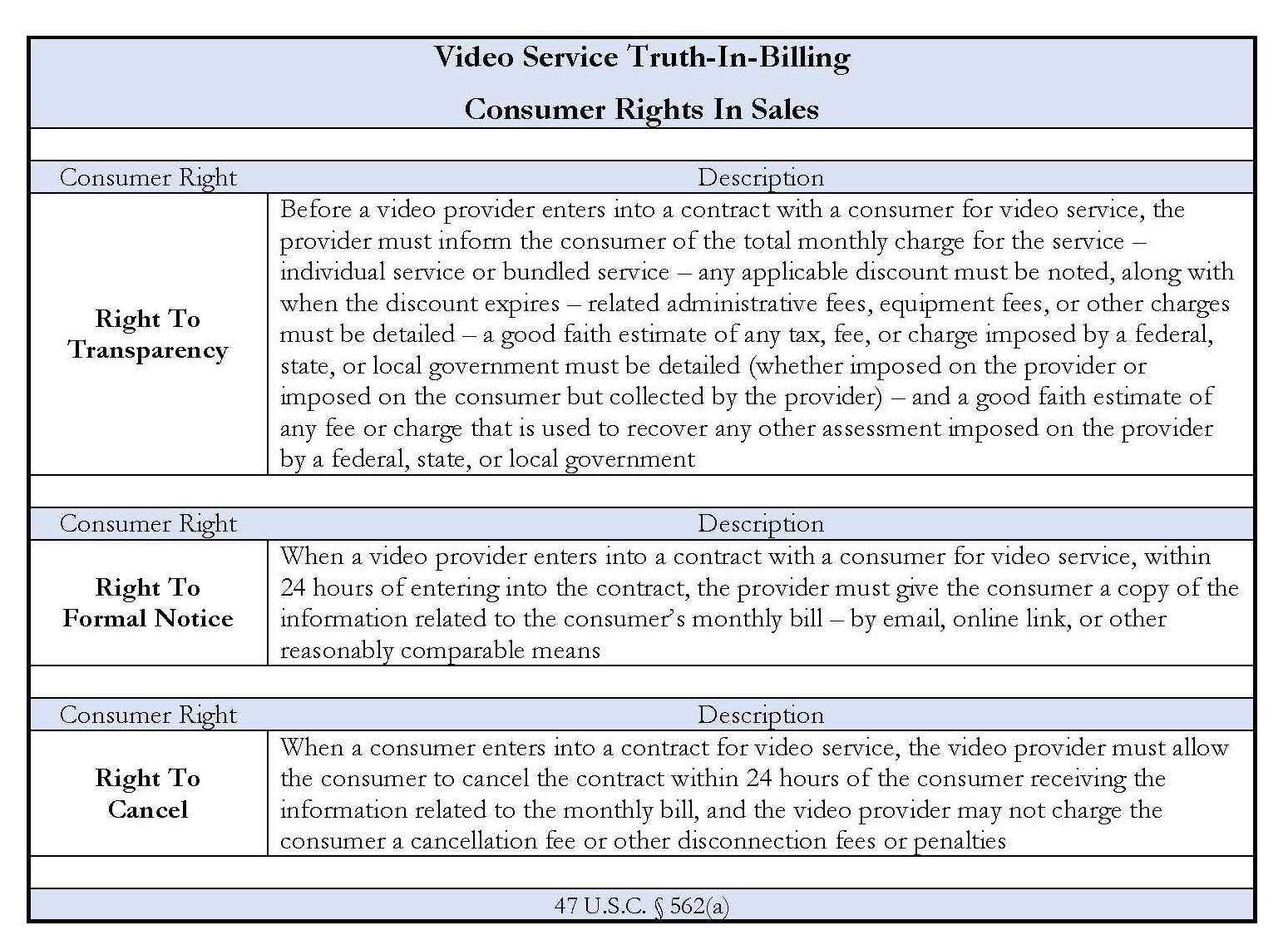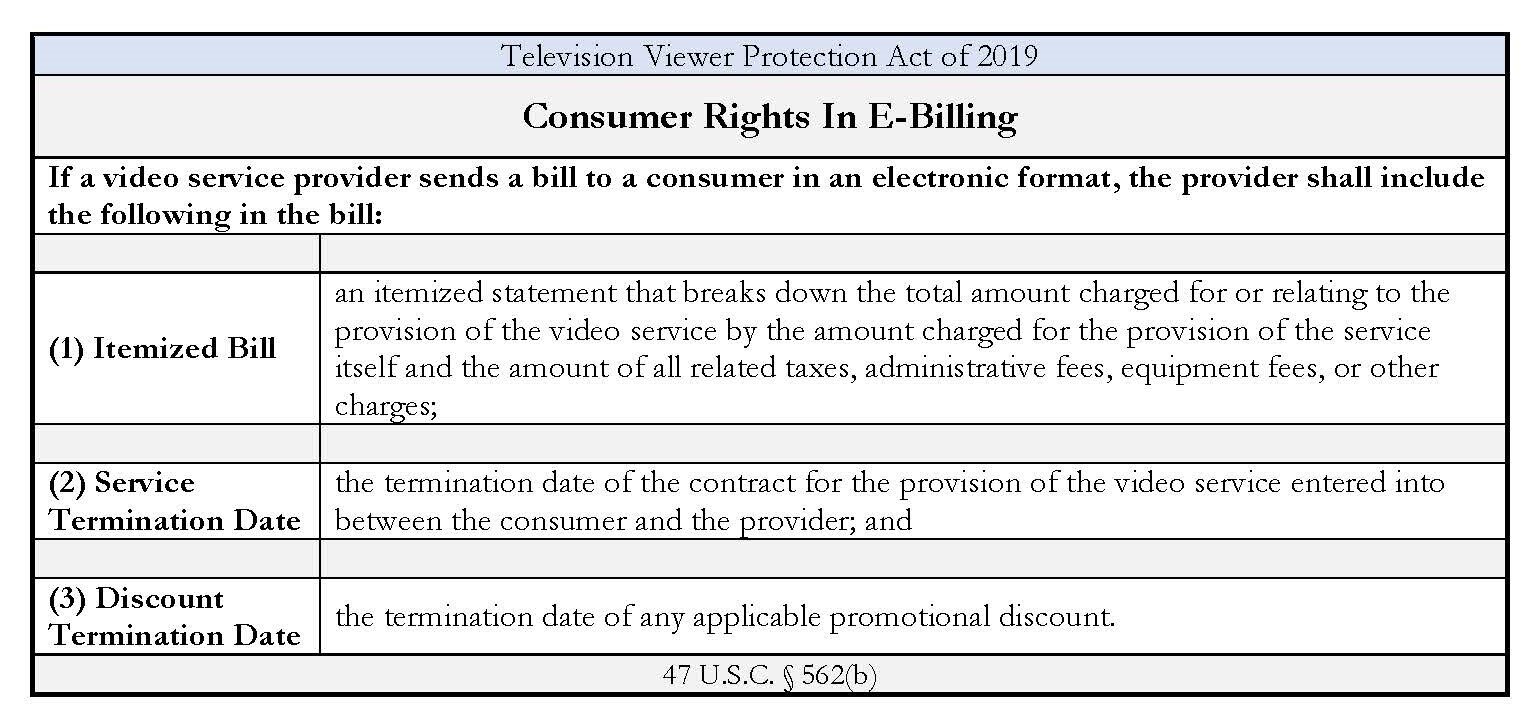Video Truth-In-Billing Requirements Effective December 20, 2020
April 6, 2020 – In December 2019, the Television Viewer Protection Act of 2019 (“TVPA”) was signed into law.[1] The TVPA added Section 642 to Title VI of the Communications Act of 1934. Section 642, codified at 47 U.S.C. § 562, contains certain truth-in-billing requirements for video service providers and broadband providers. The information below refers to these truth-in-billing requirements added by the TVPA as Section 562, the location where they have been codified into the Communications Act.
Truth-In-Billing Requirements
First, Section 562 requires multichannel video programming distributors (“MVPDs”) to “give consumers a breakdown of all charges related to the MVPD’s video service” before entering into a contract with a consumer for service. Electronic bills for video services provided by MVPDs also must include a breakdown of charges. When consumers purchase video service, they are often hit with “unexpected and confusing fees,” such as “fees for broadcast TV, regional sports, set-top box, and HD technology.”[2] The new “truth-in-billing” requirements were designed to help consumers better understand the fees charged by their video providers. The requirements also give consumers 24 hours in which to cancel a newly subscribed-to video service without penalty.
Second, Section 562 prohibits MVPDs and broadband providers from charging for equipment they do not provide to subscribers.
Effective Date: December 20, 2020
These new requirements put in place by Section 562 were set to become effective June 20, 2020, six months after enactment of the TVPA. However, in February 2020, the FCC sought comment on whether to extend Section 562’s effective date by six months, until December 20, 2020.[3] Prior to the end of the comment cycle, the FCC’s Media Bureau issued an Order announcing the effective date of the video truth-in-billing requirements was delayed until December 20, 2020.[4]
Video Service Truth-In-Billing Requirements: Consumer Rights In Sales
First, the video service truth-in-billing requirements in Section 562(a) provide consumers with three rights when entering into a contract to receive video service: (1) Right To Transparency; (2) Right to Formal Notice; and (3) Right To Cancel.[5]
The Right To Transparency requires that prior to entering into a contract with a consumer for video service, a video provider must give the consumer information detailing the total monthly charge for the service.
Under the Right to Formal Notice, when a video provider enters into a contract with a consumer for video service, within 24 hours of entering into the contract, the provider must give the consumer a copy of the information detailing the consumer’s monthly total bill.
Pursuant to the Right To Cancel, when a consumer enters into a contract for video service, the consumer may cancel the contract within 24 hours of the consumer receiving the information related to the monthly bill. If the consumer cancels within the 24-hour period, the video provider may not charge the consumer a cancellation fee or other disconnection fees or penalties.
Video Service Truth-In-Billing Requirements: Consumer Rights In E-Billing
Next, Section 562(b) requires video service providers that send bills in an electronic format to include specific details in the electronic bill.
Primarily, the bill must include an itemized statement that breaks down the total amount charged for the video service; the total amount of all taxes and administrative fees; the total amount of equipment fees; and all other charges. The electronic bill also must contain the termination date of the consumer’s contract for video service, and the termination date of any applicable promotional discount.
Video Service Truth-In-Billing Requirements: Consumer Rights To Accurate Equipment Charges
Finally, Section 562(c) prohibits MVPDs and broadband providers from charging for equipment they do not provide to subscribers.
**********
[1] The Television Viewer Protection Act of 2019, H.R. 5035, 116th Cong., 1st Sess., Pub. L. No. 116-94, 133 Stat. 2534 (2019). The TVPA also contains provisions related to good-faith negotiations for retransmission consent agreements by multichannel video programming distributor buying groups. It was enacted as part of the Further Consolidated Appropriations Act, 2020, H.R. 1865, 116th Cong. 1st Sess. (signed Dec. 20, 2019), https://www.congress.gov/bill/116th-congress/house-bill/1865/text.
[2] H.R. Rep. No. 116-329, 116th Cong., 1st Sess., p. 6 (Dec. 9, 2019), https://www.congress.gov/116/crpt/hrpt329/CRPT-116hrpt329.pdf.
[3] Media Bureau Seeks Comment On Whether To Extend The Effective Date Of New Truth-In-Billing Requirements In The Television Viewer Protection Act Of 2019, MB Docket No. 20-61, Public Notice, DA 20-203 (Feb. 27, 2020), https://docs.fcc.gov/public/attachments/DA-20-203A1.pdf. The Public Notice was published in the Federal Register on March 16, 2020. Accordingly, comments were due on or before April 6, 2020; and reply comments were due April 13, 2020.
[4] Implementation of Section 1004 of the Television Viewer Protection Act of 2019, MB Docket No. 20-61, Order, DA 20-375 (Apr. 3, 2020), https://docs.fcc.gov/public/attachments/DA-20-375A1.pdf.
[5] 47 U.S.C. § 562(a).






